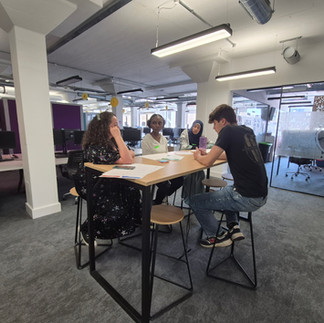Who are the young people not getting mental health help?
- Aug 11, 2025
- 4 min read
YoungMinds, ARC Wessex and the University of Southampton work together to find answers.

Over the past two years, the charity YoungMinds and the University of Southampton, funded by Economic and Social research Council and supported by National Institute for Health and Care Research (NIHR), have been talking to groups of young people who struggle with mental health issues like depression or anxiety but don’t get professional help. These young people are often referred to as the “missing middle.” This study looked at who the “missing middle” are and why they are not getting help. The project also asked young people for ideas on how to improve support for this group.
What Did the Study Find?
Through workshops and discussions with young people and young researchers, the study found that there are many reasons why someone might not get mental health support. These include:
Background and beliefs – like where they come from, what they believe about mental health, and their family situation.
Barriers – like needing permission from adults or not knowing where to go for help.
Helpful factors – like support from friends or schools that make it easier to ask for help.
Seriousness of their problems – whether adults and health services recognise that a young person needs support.
Researchers are currently verifying insights gathered through workshops and discussions with young people and young researchers by analyzing existing cohort data collected over the years.
Recommendations for support for the missing middle
YoungMinds shared 10 personas of young people aged 15 to 24, with a group of 12 young people who are part of the “missing middle”. The personas were based on real-life experiences and showed the different backgrounds and challenges people in the missing middle face. After exploring these personas, the group came up with ideas for how schools, universities, and the government could improve mental health support.
Here are some of their ideas:
Train all school and college staff to better understand mental health.
Create peer support groups for students with similar life experiences, backgrounds, or school interests.
Build youth hubs where all young people can meet others, feel safe, join in activities, and get help for their mental health
Give better support to apprentices, making sure workplace mentors help apprentices feel supported and included.
Help young carers (young people who look after family members), even if they are under 16 or still in school. The Department of Work and Pensions should improve the benefits young carers get, and the local council should do more to let them know what support is available.
Support LGBTQIA+ students in universities with safe spaces and housing options.
Make sure all health workers are trained to give caring, personal, and fair support to people from different backgrounds, including those with complex or overlapping identities, because mental health can look different for different groups.
Change strict mental health referral rules, so young people don’t feel like they need to be “sick enough” to get help.
The findings have been shared at major psychiatry conferences in London and Strasbourg and aim to improve how mental health support is designed and delivered. They are also due for publication in a prominent research journal.
Corine Driessens, one of the researchers based in Southampton, said: “It has been a truly wonderful and positive experience working with these groups of young people. Their innovative and fresh ideas across a wide range of ways to help others get the mental health support they need have been inspiring.”
Olly Parker, Head of External Affairs and Research at YoungMinds, said: “This research from YoungMinds and the University of Southampton shines a vital light on the record numbers of young people needing mental health support. Growing up today is incredibly tough. Many young people are experiencing multiple pressures which impact their mental health, including poverty, inequality, intense academic pressure and the online world, so it’s no wonder so many are struggling.
One of the clearest recommendations from the young people involved is the urgent need for early support hubs in every community. We know many young people face long waits for mental health support and become more unwell while waiting, which can lead to needing more urgent care.
We need major reforms to address the root causes of poor mental health and for the Government to focus on reducing waiting lists so young people can get the support they need. The recent 10 Year Health Plan showed promising commitments with Young Futures Hubs and Mental Health Support Teams. These initiatives are vital to reducing pressures on the system, improving support and reducing waiting times - their rollout must be a political priority. But more is needed to tackle the scale of need - we need radical solutions that will address the reasons why so many young people are struggling in the first place.”
Some of the young people who took part in the workshops recorded their reflections of the day on their phone:
Additional notes:
The findings showed that a mix of factors can influence whether a young person uses mental health services. These include things like their background, personal beliefs about mental health and support system, family relationships, financial stress (predisposing factors), barriers (e.g. access controlled by gatekeepers) and support that makes it easier to access services (enabling factors), and how serious or recognised their mental health needs are. The University of Southampton research confirmed that the most important factor in whether a young person with mental health symptoms gets support is if service providers recognise and acknowledge their needs. It’s not just about whether young people feel they need support, but largely depends on whether professionals identify and evaluate their mental health.



















